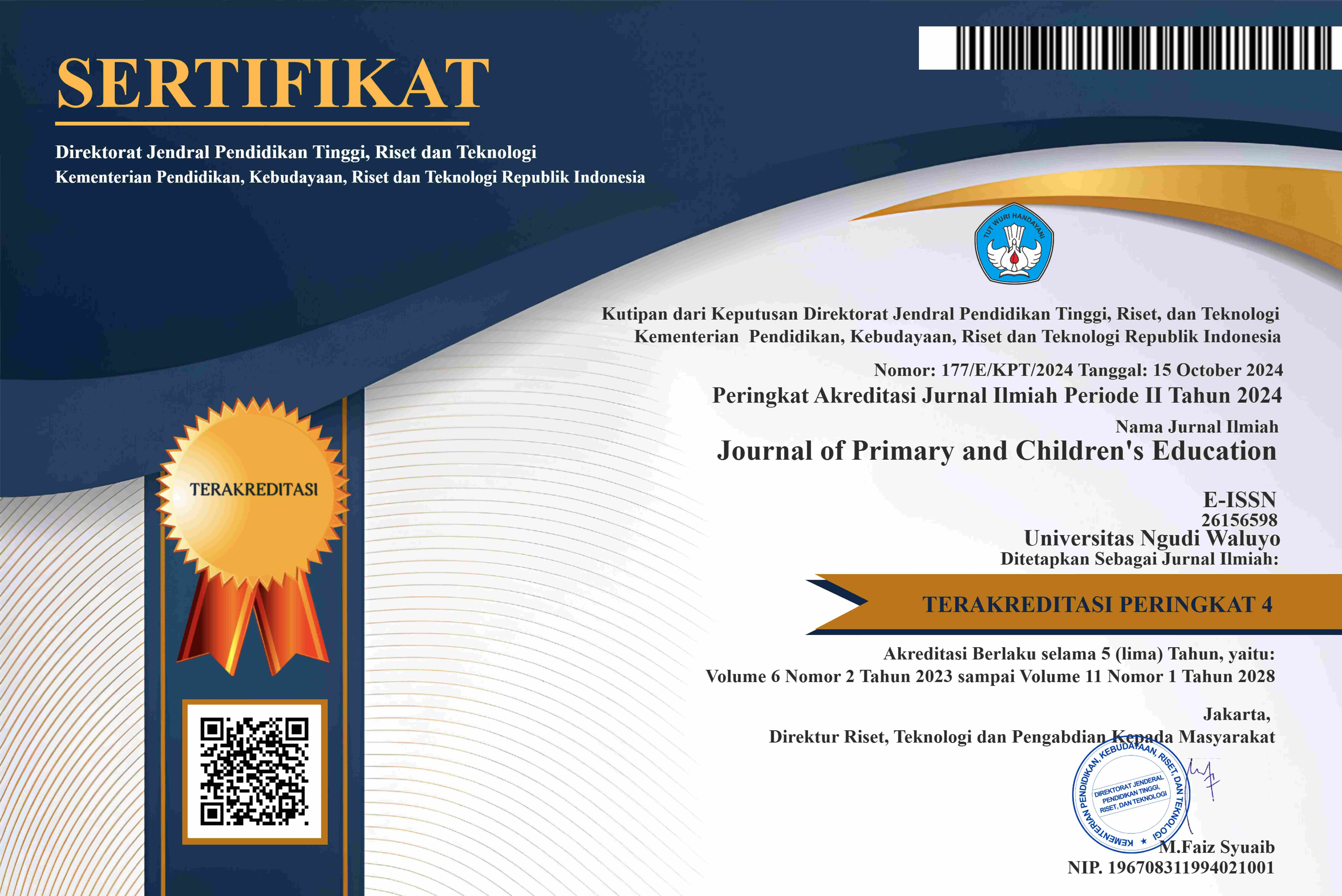Peningkatan Proses dan Hasil Belajar Matematika Menggunakan Model Problem Based Learning di Sekolah Dasar
DOI:
https://doi.org/10.35473/jnctt.v7i1.2592Keywords:
learning outcames, Sustainability; Problem Based Learning Models; Understanding Concepts; Thematic Learning.Abstract
Mathematics is considered a difficult subject matter for students, which causes problem-solving processes and low learning outcomes. This collaborative classroom action research (PTKK) was carried out to improve the process and results of learning mathematics on the topic of addition and subtraction of 1st grade students of SD Negeri Randuacir 03 Salatiga. It was carried out over two cycles with two meetings in each cycle. The data collection technique uses test techniques in the form of posttests and non-tests in the form of observations, with data collection tools using posttest questions, student learning process observation instruments, and teacher activity observation instruments. The posttest questions were tested for validity with a significance of 0.05 and reliability with the reliable category. The results of the research obtained (1) that the problem-based learning model can improve the learning process in class I, which is known from the results of observations of student learning processes and teacher activities in the pre-cycle; the percentages were 42.85% and 57.14 in the category not good, cycle I 72, 32%, and 71.42% in the good category, and cycle II 85.71% and 92.85% in the very good category; and (2) that the problem-based learning model can improve learning outcomes with a percentage of 78.57% from the pre-cycle to cycle I and 100% from cycle I to cycle II. The conclusion from the research results is that the problem-based learning model can improve the mathematics learning process and outcomes of 1st grade students.
Abstrak
Matematika dianggap sebagai muatan pelajaran yang sulit bagi siswa yang menyebabkan proses pemecahan masalah dan hasil belajar rendah. Penelitian Tindakan Kelas Kolaboratif (PTKK) ini dilakukan untuk memperbaiki proses dan hasil belajar matematika topik penjumlahan dan pengurangan di kelas I SD Negeri Randuacir 03 Salatiga yang dilaksanakan selama dua siklus dengan tiap siklus dua pertemuan. Teknik pengumpulan data menggunakan teknik tes berupa posttest dan nontes berupa observasi, dengan alat pengumpulan data menggunakan soal posttest, instrumen observasi proses belajar siswa, dan instrumen observasi aktivitas guru. Soal postest diuji validitas dengan signifikansi < 0,05 dan uji reliabilitas dengan kategori reliabel. Hasil penelitian diperoleh (1) model Problem Based Learning dapat meningkatkan proses pembelajaran di kelas I yang diketahui dari hasil observasi proses belajar siswa dan aktivitas guru pada pra siklus diperoleh presentase 42,85% dan 57,14 dengan kategori kurang baik, siklus I 72,32% dan 71,42% dengan kategori baik, dan siklus II 85,71% dan 92,85% dengan kategori sangat baik; (2) model Problem Based Learning dapat meningkatkan hasil belajar dengan presentase 78,57% pada pra siklus ke siklus I dan 100% dari siklus I ke siklus II. Simpulan dari hasil penelitian bahwa model Problem Based Learning dapat meningkatkan proses dan hasil belajar matematika siswa kelas I.
References
Afandi, M., Chamalah, E., & Wardani, O. P. (2013). Model dan Metode Pembelajaran di Sekolah. In Gunarto (Ed.), Unissula (1st ed.). Unissula Press. https://doi.org/10.1016/j.cpc.2008.12.005
Agustin, V. N. (2013). Peningkatan Aktivitas Dan Hasil Belajar Siswa Smp Menggunakan Model Problem Based Learning. Journal of Elementary Education, 2(1), 113–120. https://doi.org/10.33369/diklabio.1.1.113-120
Arikunto, S., Suhardjono, & Supardi. (2015). Penelitian Tindakan Kelas (Suryani (ed.)). PT Bumi Aksara.
Arlindra Rizma Saputri, Siti Patonah, & Mudzanatun. (2023). Efektivitas Pembelajaran Tema Selalu Berhemat Energi Bermuatan Sustainability Menggunakan Model Problem Based Learning Terhadap Pemahaman Konsep. Janacitta, 6(1), 28–37. https://doi.org/10.35473/jnctt.v6i1.2266
Cahyo, R. N., Wasitohadi, W., & Rahayu, T. S. (2018). Upaya Meningkatkan Hasil Belajar IPS Melalui Model Problem Based Learning (Pbl) Berbantuan Media Audio Visual Pada Siswa Kelas 4 SD. Jurnal Basicedu, 2(1), 28–32. https://doi.org/10.31004/basicedu.v2i1.23
Darmadi, H. (2015). Desain dan Implementasi Penelitian Tindakan Kelas (PTK). Alfabeta.
Helmiati. (2012). Model Pembelajaran. In L. Susanti (Ed.), Aswaja Pressindo. Aswaja Pressindo. https://b-ok.asia/book/11172046/445481
Indarwati, D., Wahyudi, W., & Ratu, N. (2014). Peningkatan Kemampuan Pemecahan Masalah Matematika Melalui Penerapan Problem Based Learning Untuk Siswa Kelas V Sd. Satya Widya, 30(1), 17. https://doi.org/10.24246/j.sw.2014.v30.i1.p17-27
Kustianti, S. P. (2022). Peningkatan Hasil Belajar Matematika Menggunakan Model Pembelajaran Problem Based Learning (PBL) Bagi Siswa Kelas I SDN 05 Sitiung. Jurnal Sakinah, 4(2), 58–62. https://www.jurnal.stitnu-sadhar.ac.id/index/index.php/JS/article/view/121.
Kusumaningrum, A. D. (2019). Peningkatan Aktivitas dan Hasil Belajar Siswa Kelas IV Pada Materi Koperasi Melalui Model Problem Based Learning.
Latifa, H. L., Untari, M. F. A., & Ardiyanto, A. (2020). Keefektifan Media Video Animasi Mitigasi Bencana Dengan Model Pembelajaran Problem Based Learning Terhadap Hasil Belajar Peserta Didik Kelas V SD N Kaliurang 01 Kabupaten Magelang. JANACITTA : Journal of Primary and Children’s Education, 3(2), 72–77. https://doi.org/10.35473/jnctt.v3i2.576
Melathi, D. R., & Putra, L. V. (2022). Pengaruh Model Problem Based Learning Berbantuan Permainan Monopoli Terhadap Kemampuan Pemecahan Masalah Siswa. JANACITTA : Journal of Primary and Children’s Education, 5(1), 39–46. http://jurnal.unw.ac.id/index.php/janacitta
Nugroho, U., & Edi, S. S. (2009). Penerapan Pembelajaran Kooperatif Tipe Stad Berorientasi Keterampilan Proses 1 2 2. Jurnal Pendidikan Fisika Indonesia 5, 5(2009), 108–112. http://journal.unnes.ac.id
PISA 2018 Result:What Students Know and Can Do, I OECD ___ (2018). https://doi.org/10.1787/g222d18af-en
Pamungkas, A. D., Kristin, F., & Anugraheni, I. (2018). Meningkatkan Keaktifan Dan Hasil Belajar Siswa Melalui Model Pembelajaran Problem Based Learning (Pbl) Pada Siswa Kelas 4 Sd. NATURALISTIC : Jurnal Kajian Penelitian Pendidikan Dan Pembelajaran, 3(1), 287–293. https://doi.org/10.35568/naturalistic.v3i1.268
Peraturan Indonesia Menteri Pendidikan Nasional Republik Tahun 2006 Nomor 22. (2006). Standar Isi untuk Satuan Pendidikan Dasar dan Menengah. 1993, 61–64.
Purnaningsih, W., Relmasira, S. C., & Hardini, A. T. A. (2019). Hasil Belajar Tematik Melalui Model Problem Based Learning (PBL) Kelas V SD. Naturalistic: Jurnal Kajian Penelitian Dan Pendidikan Dan Pembelajaran, 3(2), 367–375.
Rahmadani, N., & Anugraheni, I. (2017). Peningkatan Aktivitas Belajar Matematika Melalui Pendekatan Problem Based Learning Bagi Siswa Kelas 4 Sd. Scholaria: Jurnal Pendidikan Dan Kebudayaan, 7(3), 241. https://doi.org/10.24246/j.scholaria.2017.v7.i3.p241-250
Rahmasari, R. (2016). Application of Problem Based Learning Model to Increase Science Learning Result of 4th Grade Student. Jurnal Pendidikan Guru Sekolah Dasar, 36(5), 3456–3465.
Sanjaya, W. (2016). Penelitian Tindakan Kelas (E. Wahyudi (ed.); 7th ed.). Prenadamedia Group.
Setyawati, S., Kristin, F., & Anugraheni, I. (2019). Penerapan Model Pembelajaran Problem Based Learning ( PBL ) Untuk Meningkatkan Keaktifan dan Hasil Belajar Siswa Kelas 2 SD. Jurnal Ilmiah Pengembangan Pendidikan (JIPP), VI(2), 93–99.
Sitorus, M. (2022). Upaya Meningkatkan Hasil Belajar Tema 1 Sub Tema 1 “Ciri-Ciri Mahluk Hidup” Menggunakan Model Problem Based Learning Di Kelas III SD Negeri 104201 Kolam T.A 2022/2023. Educate: Jurnal Ilmu Pendidikan Dan Pengajaran, 1(3), 382–400. https://creativecommons.org/licenses/by-sa/4.0/
Sugiyono. (2016). Metode Penelitian Pendidikan Pendekatan Kuantitatif, Kualitatif, dan R&D. Alfabeta.
Downloads
Published
How to Cite
Issue
Section
License
Copyright notice:
- Authors retain copyright and grant the journal right of first publication with the work simultaneously licensed under Creative Commons Attribution License that allows others to share the work with an acknowledgement of the work's authorship and initial publication in this journal.
- Authors are able to enter into separate, additional contractual arrangements for the non-exclusive distribution of the journal's published version of the work (e.g., post it to an institutional repository or publish it in a book), with an acknowledgement of its initial publication in this journal.
- Authors are permitted and encouraged to post their work online (e.g., in institutional repositories or on their website) prior to and during the submission process, as it can lead to productive exchanges, as well as earlier and greater citation of published work (The Effect of Open Access)







